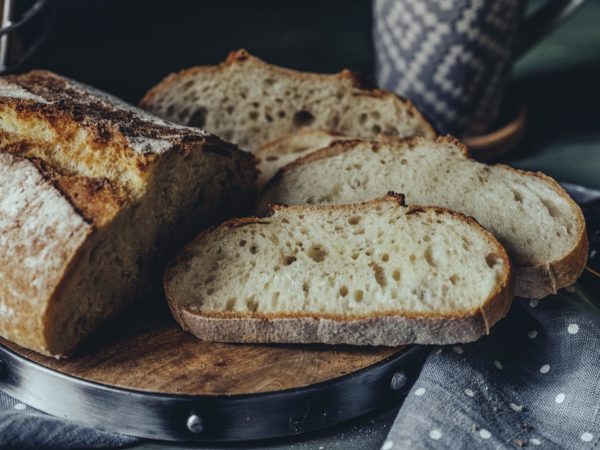Is Sourdough Bread The Best Bread?
I’m trying to limit my bread consumption, but is sourdough the best choice when I do have it?
Andrew Weil, M.D. | July 24, 2025

You are wise to limit the amount of store-bought bread you eat, since those products are usually manufactured with highly processed flours that can cause blood sugar to spike and contribute to inflammation. Breads can be homemade without processed ingredients, making them generally better choices than commercial products. Sourdough bread uses fermentation, a process that creates its distinctive flavor and delivers some added nutritional benefits.
Most breads are made with commercial baker’s yeast, which is what causes the dough to rise. Sourdough bread relies on sourdough starter, which is a combination of flour, water, and naturally occurring microorganisms. These wild yeasts and friendly bacteria cause fermentation, creating lactic acid and a low-pH environment as the dough rises. The result is a bread with a unique and appealing taste, lower gluten, some protein, and a good balance of calcium, potassium, magnesium, folate, and niacin.
When shopping for commercially available sourdough breads, look for those with 2 grams or less of sugar per serving and no preservatives or other artificial ingredients.
Although anyone may enjoy sourdough for its taste, those with specific conditions should note the following:
Individuals with irritable bowel syndrome or other gastric conditions are often advised to follow a diet low in what are called FODMAP ingredients (fermentable oligosaccharides, disaccharides, monosaccharides, and polyols). Avoiding these ingredients may reduce gastrointestinal symptoms, but it can leave patients with too little fiber in their diet. Sourdough is a good choice for those on a low FODMAP plan since it adds fiber without triggering the symptoms caused by consuming most wheat and rye products.
Those with celiac disease should avoid sourdough bread since it does contain gluten. Sourdough has much less gluten than regular white and whole-wheat breads, though, so those with gluten sensitivity may be able to enjoy it in small amounts. Check with your health care provider about it before adding to your diet. (By the way, gluten is not inherently unhealthy, and you don’t need to avoid it unless you have celiac disease or gluten sensitivity.)
See Is There a Healthy Bread Choice? and Dr. Weil’s Anti-Inflammatory Diet
See my video about sourdough here: https://www.facebook.com/watch/?v=1327327008348757
Sources
Tovar LER, Gänzle MG. Degradation of Wheat Germ Agglutinin during Sourdough Fermentation. Foods. 2021 Feb 5;10(2):340. doi: 10.3390/foods10020340. PMID: 33562539; PMCID: PMC7915439. pmc.ncbi.nlm.nih/articles/PMC7915439/
Loponen J, Gänzle MG. Use of Sourdough in Low FODMAP Baking. Foods. 2018; 7(7):96. doi/10.3390/foods7070096 mdpi/2304-8158/7/7/96












